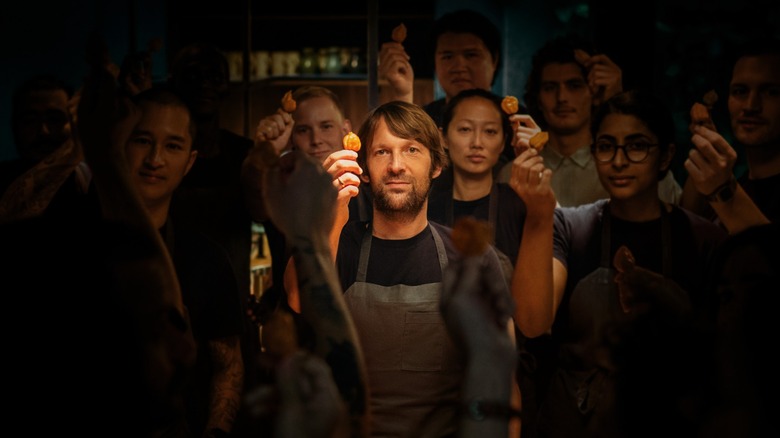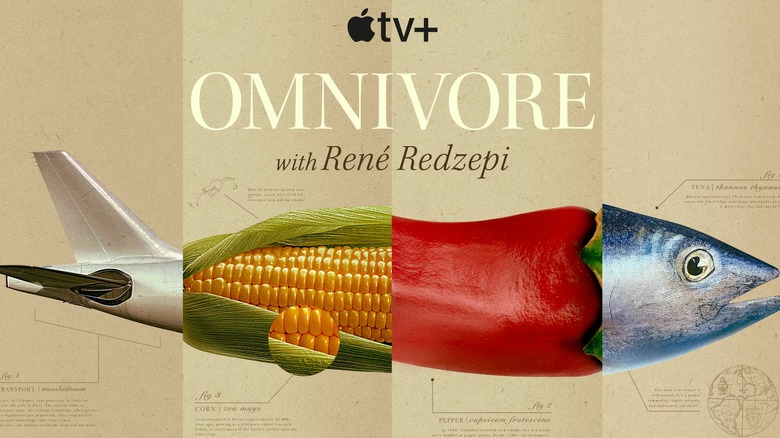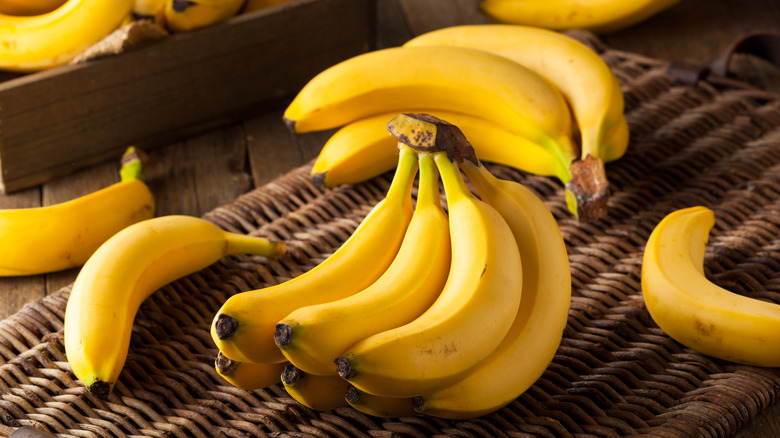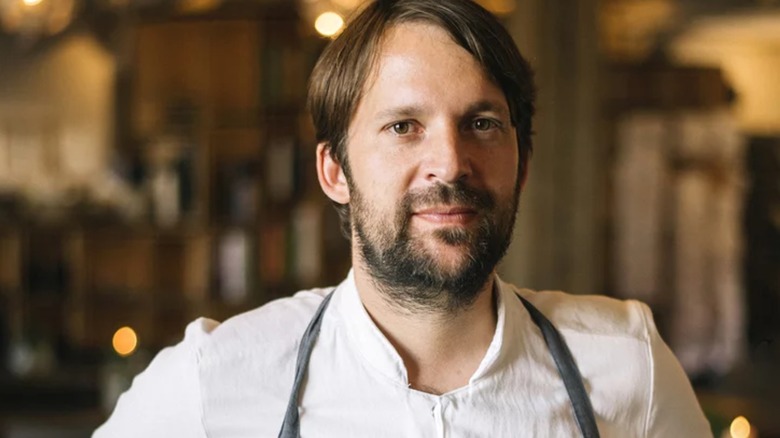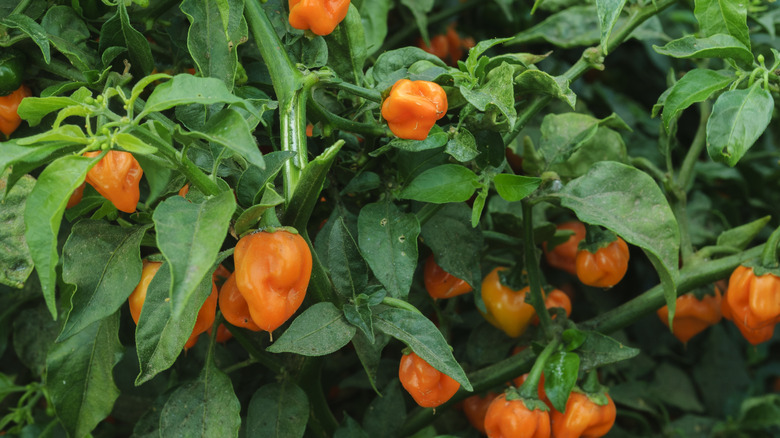The Common Food That Surprised René Redzepi While Filming Omnivore - Exclusive Interview
A lot has happened recently for celebrated chef René Redzepi. His Copenhagen restaurant Noma is closing for normal service by years end; the buzz of a second Noma pop-up taking place in Kyoto, Japan, is loud, and he recently made a cameo in Season 3 of FX's "The Bear." Keep all that in mind and it may be that "Omnivore," a new documentary featuring Redzepi as host, is perfectly timed. While that's certainly the case, the trajectory that landed the show on Apple TV+ this month is more a slow-arching fate rather than a beeline for this moment. Its development has been years in the making, both for Redzepi and "Omnivore" executive producer Matt Goulding.
As a host, Redzepi leads "Omnivore" with the idea that "food is never just food." As such, the show focuses heavily on eight ingredients — chiles, tuna, salt, bananas, pig, rice, coffee, and corn — telling the story of how human interest in each one has shaped the world's tastes and economies. Recently, Tasting Table had the opportunity to sit down with Redzepi and Goulding to talk about the impetus of the show, and how they chose these ingredients to highlight. Redzepi even shared the story of what we consider to be a completely unhinged ending to the first episode.
Why film Omnivore?
I'm really curious, who and what were the touchstone inspirations while creating "Omnivore," and what made this pantry of ingredients the ones to tell the story?
Redzepi: How it all started was a little more than 10 years ago, 10, 12 years ago, Noma was really getting to be a known restaurant. I was offered to do TV, and there was just no time to do anything but work. It did make me think if I was able to do it, what would it be? One of the things that came up very early on was the inspiration from the great nature docs like "Planet Earth," the childhood hero of mine, David Attenborough, that I used to love to watch. I still do, but I particularly loved it as a young person.
Then the idea was, can't we do what they do? The dedication, the sophistication, the care that they have, the awe and the respect toward a tiny little beetle in the Amazon. What if we did that for food? We could instill that awe and inspiration and sense of wonder, and make people see that food is just the most important, magnificent thing we have on Earth, and we should really value it and cherish it much more. That was the beginning of it. And then it sat on the back burner for many years. The idea was written down. We tried to talk to people about it, but it just never amounted to anything. And then the pandemic.
Goulding: René called up, I guess that was over four years ago, and just said, "Hey, what do you think about trying to do television and try to tell this big story?" I think the big step for us was figuring out that, hey, the best way to do this is through ingredients themselves. I felt like that gave us the opportunity to tell these kind of diverse, individual journeys of an ingredient that all tie back to this core mission of giving people a sense of value and importance for a food system they probably feel less connected to than maybe they should be.
In terms of choosing the ingredients, it was obviously a buffet of options. To narrow it down, we really wanted to find both a couple of those fundamental core tenets, you know, the staple ingredients that shape society for generations, things like rice and corn and salt that we couldn't live without, and balance those out with some surprising choices or some ingredients that might not be essential to our life, but make life worth living. Things like coffee and chile, or something like tuna that really is itself kind of in some ways a niche ingredient, but really is a potent expression of this idea that food has always been a driving force behind globalization. We really wanted to find that right balance and give every ingredient its own identity and its own sort of major theme that we can drive home.
The ubiquity of bananas
What surprised you the most about the foods that were explored in "Omnivore"? Was there anything about these ingredients, as agricultural products or as foods, that you learned?
Redzepi: For me, it was the banana. I don't know why it was the banana, because we all grew up on it. We've all been to that airport where there's nothing to eat, but you can always find a banana at the 7-Eleven or wherever it is. It doesn't matter if you're north of the Arctic Circle and the supermarket has five things on the shelves. Bananas are one of them. I didn't realize we were all eating the same thing. I didn't realize the history of the banana.
I've always grown up with the term banana republic, thinking it was a term used for a country in disrepair with some sort of a despot running the show and funneling all the money. You know what I mean? A country out of control. I never understood what laid behind the term, that it's literally the banana. There's a reason why it's called a banana republic. I just never understood that. It was so wild, the story.
Goulding: I mean, something so seemingly innocent that has such a profound impact on the geopolitical map. For me, I was really surprised with coffee. Even as a person who dedicates his life to reporting about food and writing about food, I didn't understand just the scope of expertise and the number of individuals it takes to bring coffee to life. 125 million people make their living off of coffee. An individual cup of coffee could pass through 40 or 50 sets of hands before you get a chance to drink it. It's amazing and mind blowing to think that you could still drink that for nothing, basically, if you buy coffee and you brew it at home.
To think about that level of complexity and collaboration, I felt a sense of wonder and awe even being on this side of the storytelling. We're trying to communicate as much of that as possible so that every time you take a sip or every time you take a bite, maybe you have a little bit of that moment where you pause for a second and think, "Good lord, I can't believe that I never thought this or never knew that about these ingredients."
The dish that made René Redzepi want to cook
René, as a host, from time to time you're adding personal anecdotes that really connect viewers to the story. One such account is about your auntie's Albanian chicken. You've mentioned that it's a dish that made you want to become a cook. Could you share a little bit about that?
Redzepi: Yeah, absolutely. I'll tell you the full story. My family background is a mix between Albania, or should I say former Yugoslavia, in an Albanian community in what is today Macedonia, and a very rural community where if you want a glass of milk, you milk a cow. And foods are cooked. No refrigerators, no vacuum cleaners, no electronic appliances besides light. That's how life was back then. And then, of course, just before the war broke out, our family moved full time to Denmark. We did have more of a life going back and forth from Denmark as the typical sort of immigrant-style work.
But food was amazing. When you live in such a condition and you have no phones, no messaging, how do you even visit relatives? You do that by just showing up. When I started in cooking school, there was a moment in the beginning when I was 15 and we were asked to cook something that we loved. We'd pair up in teams. Me and my friend Michael, we started searching in books at the library about just ingredients. We had no clue what to do. Then I stopped at roast chicken at the time. It gave me sort of a flashback moment to a summer in the dusty old courtyard in Macedonia. There was a knock on the big wooden gate that separates the street to our courtyard in our house. My auntie opens it, and it's relatives from a village three hours away. Immediately, the whole courtyard and house filled with commotion because they're here, and then you had to cook something. As soon as the family relatives were placed with a cup of tea, my auntie and uncle, they went and rounded up two chickens and chopped the heads of them.
I have these memories so vivid in me, us, the young kids, me, my brother, my cousin Nasuf, who also works at Noma today, running around after these headless chicken, blood squirting out of them. Then we'd watch these chickens being plucked, rubbed in oil, a tiny bit of chile, cooked in a wood-fired oven with a pan of rice underneath to absorb all those juices. The smell of the chicken as it came to the table. The steam that rose when the thigh was broken into. A fragrant chicken rice today is probably still one of the most comforting things I know. Rice that's been cooked and has been glazed in chicken fat is one of the most beautiful things you can eat on earth. And yeah, that's my rice and chicken moment. We had roast chicken today, actually, for staff meal, but with potato, pommes puree, Robuchon style with lots of butter and then gravy.
Dosing a 1.2 million Scoville pepper at work
The shots of Noma in particular throughout the first episode of "Omnivore" are so unique. In the case of Episode 1, it's also a pretty wild watch. Can you walk us through that final segment of Chile? I mean, did the Noma staff really dose on a Copenhagen bhut orange pepper?
Rene Redzepi: We all did. It's 1.2 million [Scoville heat units].
1.2?
Redzepi: 1.2. But no, we did it. And of course, everyone was asked if they wanted to. Nobody ate that if they didn't. We had approximately, I would say, half our team that were like, "No, no, thank you." Then the other half, they were like, "Of course I'm going to try it."
But have you ever tried a super hot?
It's pretty brutal.
Redzepi: It's brutal. You turn momentarily insane. You think it's never going to end, what have I done? Panic. A panic ensues. But everyone else is in the same boat. It was crazy. It was like 10 minutes of insanity. And then to watch the guests go through it was fun. I watched my wife sit there. To tell the truth, we had so many guests that are regulars that came for that night, and many of them said it was their favorite night at Noma ever. We just served them two peppers, one spicy and one mild. It was a real night to remember. There was a band in the restaurant, a classic –
Goulding: We had an orchestral arrangement.
Redzepi: Orchestral arrangement playing LCD sound system. It was magic. It was an hour and a half of magic.
Goulding: I should say an hour and a half of magic, that took three, four months, really, of planning because we planted those seeds here in the greenhouse of Noma right next door to where we're sitting right now. Harvesting those and planning all of this and putting the pieces together, I think in general it speaks a little bit to what the ambition and the scope of the series are. We really want to try to take this into a new frontier, if possible, in the world of food storytelling.
"Omnivore" premieres globally on Friday, July 19, on Apple TV+.
